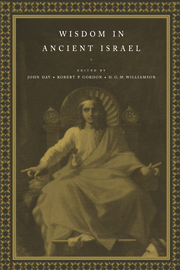Book contents
- Frontmatter
- Contents
- List of abbreviations
- Introduction
- Part 1 The ancient near eastern setting
- Part 2 Old Testament and Apocryphal texts
- 4 Foreign Semitic influence on the wisdom of Israel and its appropriation in the book of Proverbs
- 5 The limits of theodicy as a theme of the book of Job
- 6 Qoheleth
- 7 A house divided: wisdom in Old Testament narrative traditions
- 8 Wisdom in Solomonic historiography
- 9 Amos and wisdom
- 10 Hosea and the wisdom tradition: dependence and independence
- 11 Isaiah and the wise
- 12 Jeremiah and the wise
- 13 The wisdom psalms
- 14 Wisdom and Daniel
- 15 Ecclesiasticus: a tract for the times
- 16 The Christian use and the Jewish origins of the Wisdom of Solomon
- Part 3 Themes
- Biographical note: John Adney Emerton
- Bibliography of the works of John Adney Emerton
- Indexes
- Principal biblical and apocryphal references
11 - Isaiah and the wise
Published online by Cambridge University Press: 16 October 2009
- Frontmatter
- Contents
- List of abbreviations
- Introduction
- Part 1 The ancient near eastern setting
- Part 2 Old Testament and Apocryphal texts
- 4 Foreign Semitic influence on the wisdom of Israel and its appropriation in the book of Proverbs
- 5 The limits of theodicy as a theme of the book of Job
- 6 Qoheleth
- 7 A house divided: wisdom in Old Testament narrative traditions
- 8 Wisdom in Solomonic historiography
- 9 Amos and wisdom
- 10 Hosea and the wisdom tradition: dependence and independence
- 11 Isaiah and the wise
- 12 Jeremiah and the wise
- 13 The wisdom psalms
- 14 Wisdom and Daniel
- 15 Ecclesiasticus: a tract for the times
- 16 The Christian use and the Jewish origins of the Wisdom of Solomon
- Part 3 Themes
- Biographical note: John Adney Emerton
- Bibliography of the works of John Adney Emerton
- Indexes
- Principal biblical and apocryphal references
Summary
In discussions of the connections between wisdom and the prophets it is usually Isaiah who has attracted most attention. Although chs. xl–lv have frequently been studied from this point of view, the present chapter will focus on Isaiah of Jerusalem, for it is here, with Fichtner's work, that this whole movement in scholarship is generally held to have begun, and it is around this figure that many of the questions of method have been raised. I shall first survey some of the principal contributions to this discussion before moving on to offer some more general reflections.
Survey of research
Fichtner's brief but programmatic article notes that Isaiah is sharply critical of ‘the wise’, whom he identifies with Judah's politicians (e.g. iii 1–3, v 21, xxx 1–5, xxxi 1–3), that a number of his sayings are reminiscent of what we find in the book of Proverbs (e.g. compare v 21 with Prov. xxvi 5, 12, 16, xxviii 11, and xxix 13 with Prov. xxvi 23), and that his portrayal of the future ideal ruler in ix 5–6 and xi 2 includes features which are extolled in the wisdom writings. From these observations he suggests that Isaiah originally belonged to the class of the wise but that he turned against his background at the time of his call because wisdom had become divorced from its divine origins (cf. vi 9–10), though he nevertheless retained the hope that eventually a ruler would be raised up who would restore the original ideal.
- Type
- Chapter
- Information
- Wisdom in Ancient Israel , pp. 133 - 141Publisher: Cambridge University PressPrint publication year: 1995
- 1
- Cited by



